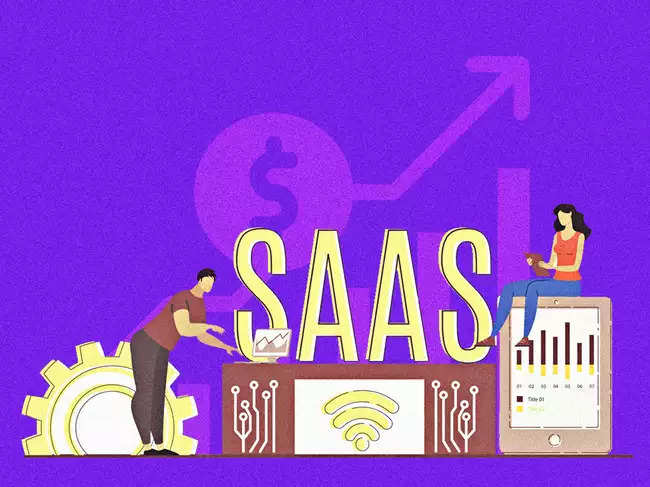Indian software startups are under pressure to retool themselves this year to leverage artificial intelligence (AI) and integrate it in their product offerings and business models. At least half a dozen investors ET spoke to said it will be crucial for early-stage software companies to showcase how they are leveraging AI in their products to attract new investments in 2024. “We are at a point in SaaS where we will see ‘mass retooling’ of companies in 2024.
Category after category, companies will figure out how to leverage AI with the intent to make their products 10x better,” said Rajan Anandan, managing director of Peak XV Partners (formerly Sequoia Capital India & Southeast Asia) & Surge. “An early stage SaaS company today needs to be leveraging AI in a fundamental way to build; otherwise, others could enter their space with a 10x better product,” he said. This comes at a time when the domestic software-as-a-service (SaaS) market is already facing the brunt of macroeconomic headwinds, industry watchers said, citing that revenue multiples for valuations have been adjusted, bar for early stage investments is going up, and clients continue to reduce software spends to keep costs under check.
Further, lack of domestic AI talent and expensive open models are making it a capital-intensive investment for local SaaS players, especially at a time when capital is hard to come by, they said. Investors and operators now expect 2024 to usher in strong consolidation as venture backers focus on innovation brought through AI at a time when most SaaS categories across sales, infrastructure, developer tooling, among others are hitting saturation. Investor excitement towards AI can be inferred through deals such as Chennai-based in Series A funding last month from Lightspeed India, Peak XV and Khosla Ventures, contradicting the larger trend of a funding winter.
Further, acquisition of Indian AI-powered video creation platform Rephrase. ai by technology giant Adobe shows exit opportunities for Indian investors. “What every investor is expecting now is basic levers of leveraging AI and that it is part of a company’s business model,” said Nishit Garg, partner at RTP Global.
“The base intelligence of every layer is shifting upward with AI and it is becoming clear that a successful company cannot be built without it. ” The pressure on Indian SaaS providers to deliver on investor expectations around AI is further aggravated with increasing saturation in existing software segments and turning of capital cycles. This is likely to lead to increasing consolidations and shutdowns in 2024, as it gets harder to launch newer products with differentiation becoming a challenge.
This can be seen in examples across the US such as design startup InVision, which raised over $350 million from investors, and shut down this year, after competitor Figma’s product surged in popularity. With the advent of AI, Lightspeed India partner Hemant Mohapatra said cycles are shifting in SaaS from operating expenses (opex) heavy to again being capital expenditure (capex) heavy, as last seen with the internet revolution. “In capex cycles, focus is more on R&D and net-new innovation whereas opex cycles focus a lot on sales and marketing,” Mohapatra said.
“Most SaaS categories (such as sales, marketing, security, and dev tooling) are now saturated. Focus for VC (venture capital) dollars is on new innovation in SaaS, and this is increasingly becoming the dominant conversation during fund raising. ” As the fundraising market toughens, smaller startups are expected to be facing the absolute brunt of retooling to AI as India continues to lack a strong talent base in the segment, which also tends to be expensive.
“AI is a big opportunity and if a company is not thinking about it, they will be irrelevant,” said Parthiban, chief executive and cofounder of SuperOps, an AI-led IT management software provider. “The disadvantage that Indian SaaS faces is the lack of availability of talent in AI and high cost to acquire them. Also, AI requires heavy retraining and investment coupled with expensive open models.
So, founders have to be sharper on the problems they are looking to solve with AI,” he said. With talent being sparse, SuperOps had to hire its AI team in New Zealand. Additionally, the bar for investment is only going up for early stage SaaS startups.
According to investors, SaaS companies have to at least show $2 million in annual revenue run rate (ARR) in 2024 to raise Series A rounds, a sharp contrast from the $300,000 ARR at which companies were getting funded in 2021. With the lull in public markets, the multiples ascribed to these companies have also been adjusted. Stay on top of and that matters.
to our daily newsletter for the latest and must-read tech news, delivered straight to your inbox. .
From: economictimes_indiatimes
URL: https://economictimes.indiatimes.com/tech/startups/domestic-saas-companies-face-pressures-to-retool-themselves-to-ai/articleshow/106873750.cms



